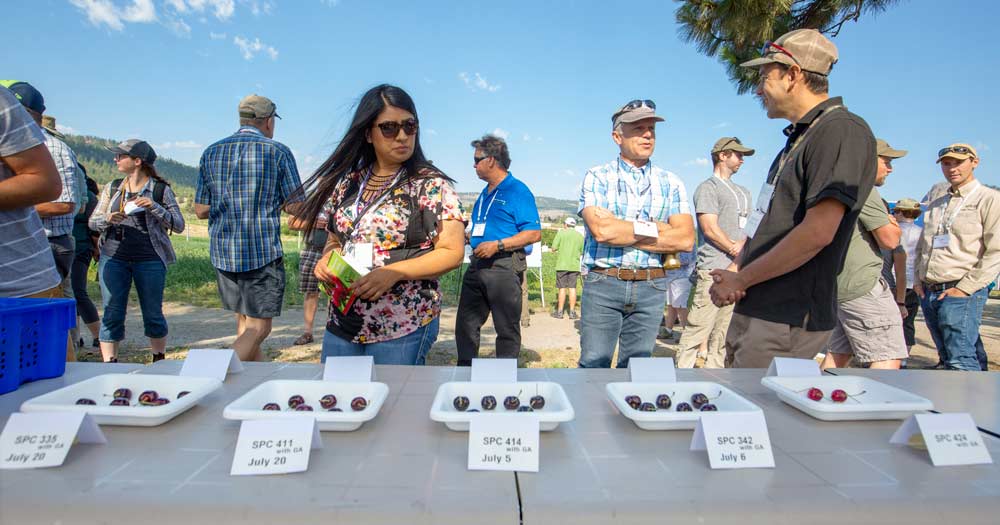
Nick Ibuki, right in black shirt, shows five new unreleased cherry varieties to International Fruit Tree Association attendees at the Agri-Food Canada’s Summerland Research and Development Centre during the 2018 IFTA summer tour in British Columbia, on July 23. (TJ Mullinax/Good Fruit Grower)
The numbered cherry varieties that Nick Ibuki had planned to show off to the tour participants may have looked a little too good. A few had been eaten off his display trays by the time he took the microphone.
“Somebody stole my biggest cherries,” he said with a laugh.
Still, minus a few samples, Ibuki described five yet-unnamed varieties working their way through the selection process at the Summerland Research and Development Centre for the participants of the International Fruit Tree Association’s summer tour through the interior of British Columbia. Ibuki is the business development manager for Summerland Varieties Corp., a private company that works with the center to commercialize new fruit cultivars.
The research center’s breeding program is responsible for several big hits, such as Lapins, Skeena and Stella, the world’s first commercial self-fertilizing cherry variety, released in 1968. One of the more recent releases is Suite Note, a dark red monster of a cherry weighing an average of 12.9 grams. In fact, tour participants gobbled up a bin full of tasting samples like they were candy, leaving the adjacent Lapins all but untouched.
But the work continues, with some unnamed varieties bred to replace Bings and some to push the harvest date later, as late as mid-September. British Columbia cherry growers typically try to harvest after Washington growers have finished to fill the late-season market.
Here is a look at the five Ibuki shared with the tour.
—Summerland PICO Cherry (SPC) 414 has a Bing harvest timing in early July but is bigger, self-fertile and holds up under shipping. It will likely grow mostly in the south near the Washington border.
—SPC 342 is another giant, averaging 12.5 grams. It eats like a Skeena and splits less often than a Bing. It is not self-fertile, however. It also has an early July harvest timing.
—SPC 335 is a firm cherry with Lapin timing in mid to late July but with fewer splits. It is not self-fertile, however, like Lapins.
—SPC 411 is self-fertile and it is firmer than Sentennial, which so far is Summerland’s variety best known for firmness. That makes it popular with international buyers who tour the station. “The Chinese buyers just love this for that firmness,” Ibuki said. It also is low-splitting, similar to Regina. It harvests in mid to late July, similar to a Sweetheart.
—SPC 424 is early in the testing process but harvests in mid-August and is large and firm.
The five samples, chosen because they were available for harvest at the time of the tour, are all at various stages of the selection process. Even after one is chosen, it takes time for the company to build up enough virus-free material for a commercial release.
“Expect at least one to likely be released in the next year or so though,” Ibuki said in a follow-up interview.
Summerland will make international releases through clubs. •
—by Ross Courtney






Leave A Comment